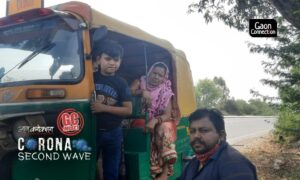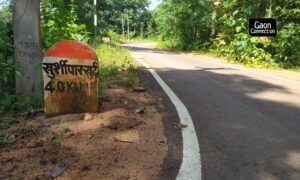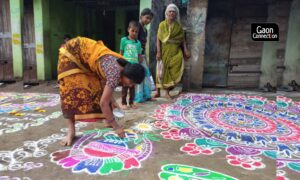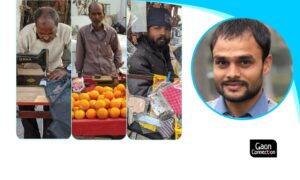When it comes to needing blood for a surgery or a medical procedure, it is rather unusual to turn to a WhatsApp group run by a policeman. But this is exactly what many people in Uttar Pradesh, India do and to good results.
“I remember thinking to myself that I will work for the police department for 40 years and then retire. However, another series of thoughts cropped up – shouldn’t I be doing something for the society as well? Isn’t that my responsibility, especially when I wear the uniform? This thought changed my life,” said Ashish Mishra, 31, a constable posted with the Inspector General’s Office in Prayagraj, Uttar Pradesh.
It is also this thought that has helped in saving lives of more than 1,400 people till date.
Answering the call of conscience
On February 25, 2017, Ashish visited a temple. He met an elderly lady who was begging and crying. He gave her some cash but couldn’t stop himself from asking about the reason behind her dismal condition.
She told him between her tears that she had recently lost one of her children. Her child was unwell and needed blood, but there were no donors. This made a deep impact on Ashish. He went to a blood bank in the vicinity to donate blood so that other needy patients could be saved. But even after donating blood, he came to know that his donation had not come in time for a young girl who passed away as the blood couldn’t reach her when she needed it the most. His donation, he was told, would perhaps help someone else.
This incident gave birth to Police Mitra – an initiative that was started by Ashish in the same year. The aim was simple – to ensure needy patients get blood in time and their families don’t have to run around in a time of crisis.
“There were many social media platforms. I thought of putting them to a good use. I created a WhatsApp group called Police Mitra. When I started the group, I wasn’t expecting anything. But now around 1,000 people are associated with us and we are active in all the eight zones of Uttar Pradesh,” says Ashish taking our call from Prayagraj over the hustle-bustle of a busy police station, evident in the background during the call.
“Not just the common people and those needing blood, but even top-ranking police officers, many IAS & IPS officials, policemen posted in Uttar Pradesh Special Task Force (STF) and Anti-Terrorist Squad (ATS), among others, are associated with this group. It helps that many social workers, professionals from different sectors, lawyers as well as students are a part of this and are doing their bit to create awareness,” he adds.
How does the group function?
“When a patient needs blood, the families get in touch with us. We spread the word even when the demand has come from elsewhere and make sure he/she gets it in time,” says Ashish.
Small, steady steps towards a larger goal
Such was the impact of this initiative that the Deputy Inspector General Prayagraj OP Singh, felicitated Ashish by giving him a silver medal for his effort. “It was a big deal for me at such a young age and so early in my career,” says Ashish.
Recently, he was invited for an international conference which was organised in Rohtas district in Bihar between November 23 and 25. He represented Uttar Pradesh Police at the blood donors’ ‘Mahakumbh’, which was also attended by blood donors from many countries including France, Kenya, Japan and Nepal as well as from different states across the country. “I was invited to the conference as the organisers had never come across a policeman who was active in organising blood donation camps on a large scale, and also motivating colleagues to save lives of poor patients,” says Ashish.
“The common man in India carries a negative image of the police in his mind. That is because they are either scared or think that the police aren’t as responsible as they should be. It also happens that there are stories in the media about drunk police personnel misusing their position or flouting the rules. This doesn’t help to improve the reputation of Indian policemen and women,” says Ashish.
An attempt to change perceptions
“I want to change this perception. I want to tell the common man that police personnel are social workers and, also their friends. In the past few years, many images of police personnel donating blood have appeared in newspapers. This has helped to a certain extent,” continues Ashish.
When asked about the gap between demand and supply when it comes to donating blood in the country, he says, “Yes, the situation is not an ideal one. I am in touch with many in my department in different districts because of the kind of work I do. When the need arises, only 10% of the constables who are a part of the group volunteer or actually donate blood.”
Initially, when he started the group, he realised that people have the habit of donating blood only when the need arises, and they don’t consider it as their social responsibility. “I waned to change this. So, I started organising blood donation camps. People would then come and donate blood. People tend to donate blood when a camp is organized in their office. Things are changing gradually, but I am sure things will change more and at a faster pace in the coming years,” says Ashish.
Talking about the blood banks, he says that they need to take some amount of blame too when it comes to the huge gap between demand and supply. “They should be doing more to raise awareness as well as give out certificates to blood donors. It helps motivate the donors and is such a simple thing to do.”
When friends unfriended him/Going on despite the odds
Initially, when Ashish started getting praise from his superiors, many of his friends distanced themselves from him. They thought he was doing this for fame and to be in the good books of his superiors. “I would cry every day. I couldn’t understand why my friends were deserting me when all I was doing was to donate blood and raise awareness about blood donation. When reporters would approach me for interviews, I would send them away because my fear was that if my picture would get published in a newspaper, more friends would unfriend me.”
Ashish’s family comprises of his parents, younger brother – who is preparing for the civil services exam, an elder brother, two married sisters, his wife and two kids. “Earlier, even my wife could not understand what I was up to. She would say that your colleagues seem to be earning more than you and look happy, then why are we struggling? It’s a fact that at the month-end, I am left with very little money. But somehow, I don’t feel like giving up on what I have started. All I am doing is saving peoples’ life. And I will continue to talk about it even if people think I am doing it for the publicity,” says Ashish.
Finally, he says, “I would appeal to everyone to donate blood. Don’t wait for a crisis. One can need a blood donation any time, anywhere. I know some people think that I am crazy to pursue this with so much passion, but remember, when you need blood, Police Mitra is here to help.”
Contact
WhatsApp Police Mitra – 9415107242
Facebook: https://www.facebook.com/upcopashish/
Twitter: https://twitter.com/UpPolicemitra



















